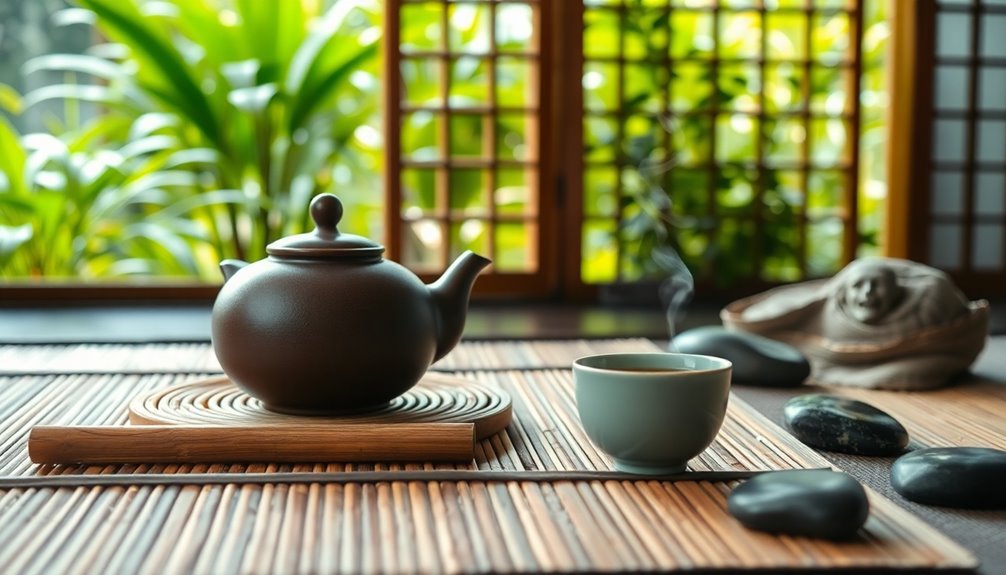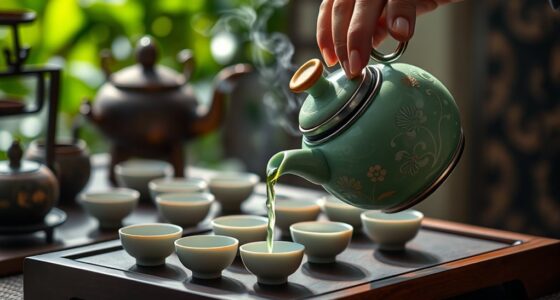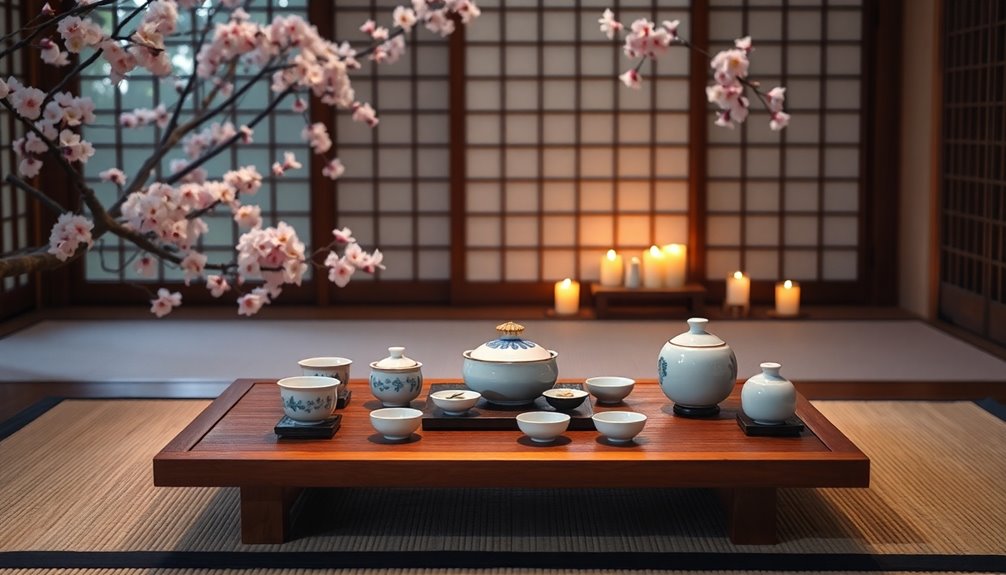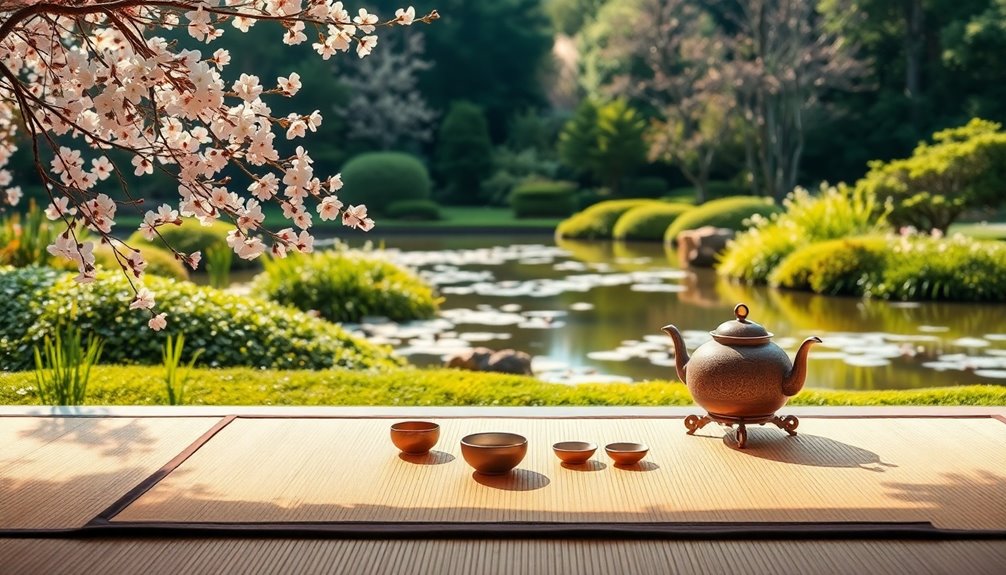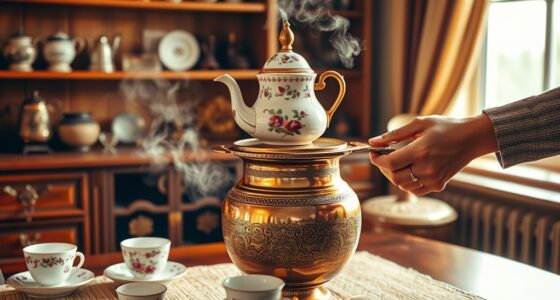Tea ceremonies are vibrant spiritual practices that you can enjoy and learn from. They emphasize mindfulness, guiding you to be present and reflect on your feelings. Each cup of tea represents deep tradition and connection to yourself and nature. During these ceremonies, silence creates a peaceful space for meditation. You'll find that preparing tea can enhance your emotional awareness, as each step engages your senses. Setting intentions, like relaxation or healing, helps create a special atmosphere. Understanding cultural significance is also key to fully appreciating the experience. Excited to uncover more about this beautiful ritual? Just keep exploring!
Key Takeaways
- Tea ceremonies are rooted in mindfulness and Zen Buddhism, promoting a meditative state and inner peace.
- Each cup of tea carries deep cultural significance, connecting participants to rich traditions and fostering self-awareness.
- The preparation process enhances emotional clarity and encourages present-moment awareness through sensory engagement.
- Cultural sensitivity is essential to avoid appropriation, emphasizing the need for understanding and respect for traditions.
- Setting intentions and creating a dedicated space enriches the tea ceremony experience, leading to spiritual growth and tranquility.
Introduction
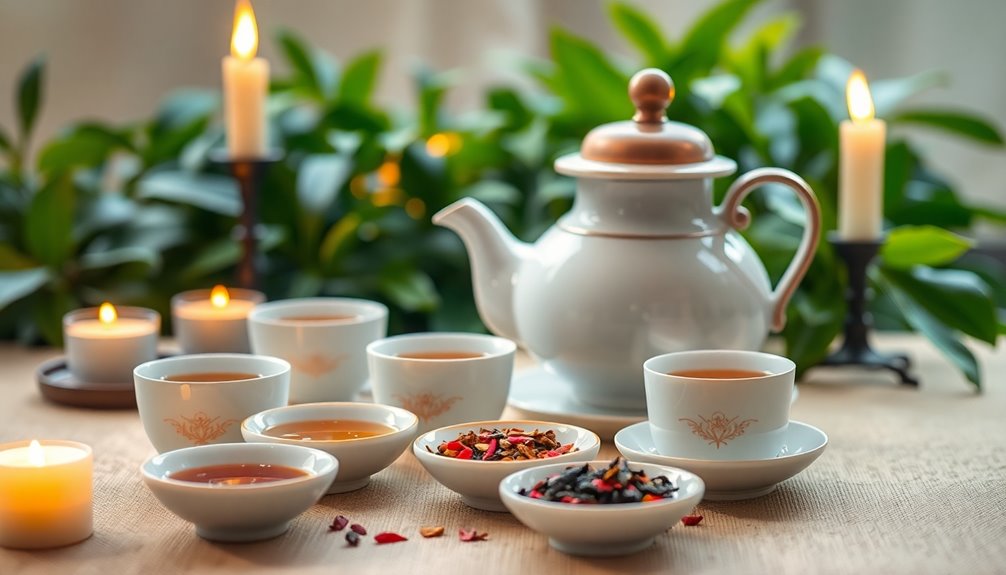
The tea ceremony is more than just a way to brew a cup of tea; it's a profound spiritual practice that invites you to engage fully with the present moment.
Rooted in Chinese and Japanese culture, this beautiful ritual emphasizes mindfulness and presence. As you prepare and enjoy the tea, you'll find a deeper connection to nature and yourself, inspired by Zen Buddhism.
During the ceremony, silence promotes a meditative state, allowing you to experience emotions without judgment. This can lead to inner peace and greater emotional awareness.
Each step in the tea-making process becomes a form of moving meditation, celebrating the simplicity and intentionality of your actions. You'll notice how every moment matters, enhancing your spiritual growth.
Engaging in a tea ceremony highlights the interconnectedness of all things involved in the experience—from the tea leaves to the water, and even your own thoughts.
It creates a space where you can reflect on the essence of the moment. So, take a deep breath, slow down, and immerse yourself in this enriching practice.
You might just discover a new way to connect with yourself and the world around you!
Cultural Significance of Tea Rituals

Moreover, tea rituals encourage mindfulness and simplicity, inviting you to appreciate the moment. This focus can lead to a spiritual awakening, providing inner peace and tranquility. So, whether you're sipping tea alone or with loved ones, remember that each cup holds a world of meaning, connecting you to the values and traditions that have enriched lives for generations. Embrace the journey, and let the tea ceremony guide you toward harmony and respect in your own life. Additionally, the practice of traditional tea ceremonies fosters a deeper connection to one's self and surroundings, enhancing the overall experience.
Mindfulness Through Tea Preparation
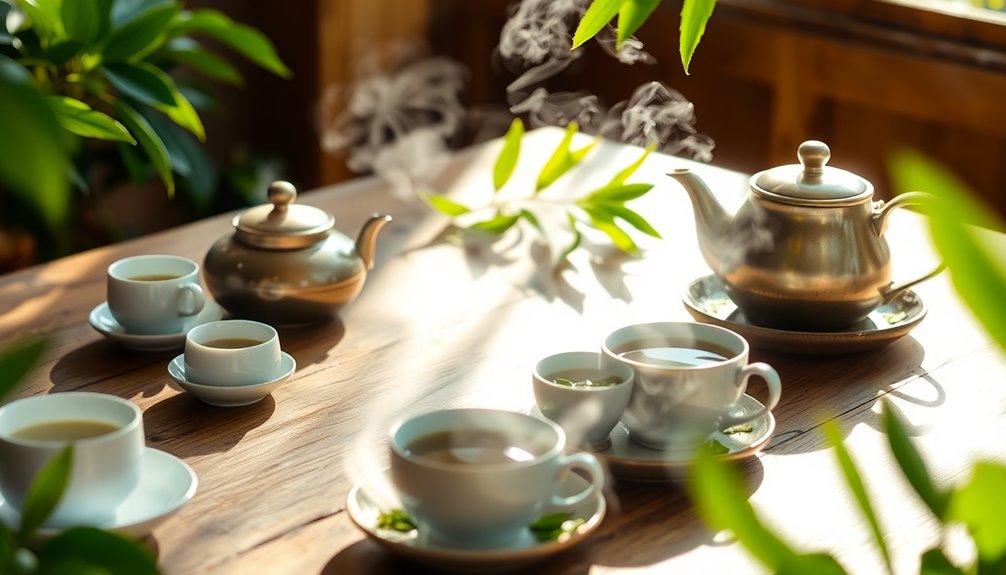
Mindfulness through tea preparation can lead to emotional awareness and clarity, enriching your experiences.
As you savor the taste of your tea, allow it to remind you of the importance of being present.
Tea's Role in Mindfulness Practice
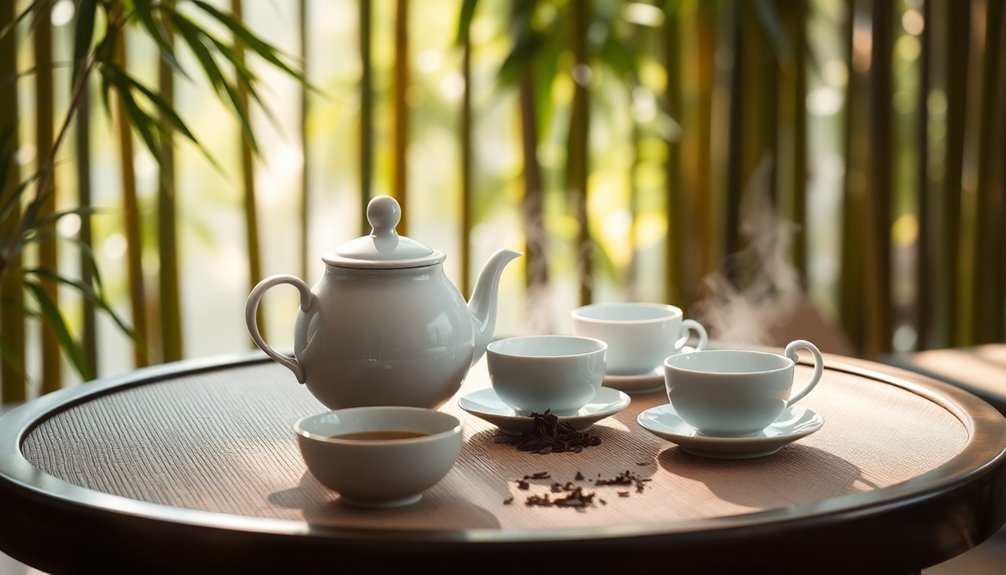
Engaging in a tea ceremony can profoundly enhance your mindfulness practice, as it requires your full attention at every stage—from boiling the water to savoring the final sip. Each step of the tea ceremony invites you to focus, helping calm your active mind and bring you into the present moment.
As you prepare the tea, embrace the stillness that surrounds you. This quiet time allows for emotional awareness, letting you acknowledge your feelings without judgment. By fostering acceptance, you deepen your connection to both yourself and your surroundings.
The intentional actions involved in this ritual—pouring, stirring, and tasting—promote sensory engagement. You'll notice the warmth of the cup, the aroma of the tea, and the taste on your tongue, all enhancing your mindfulness experience.
With every sip, you're reminded of the beauty in presence. The tea ceremony becomes not just a drink, but a spiritual practice that enriches your daily life.
Cultural Appropriation Debates
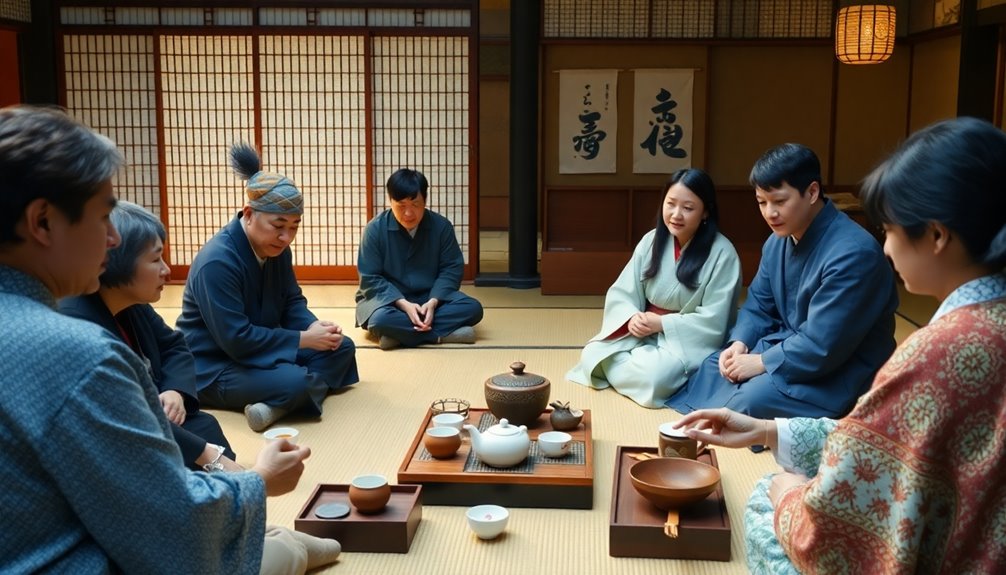
Cultural appropriation debates often arise when traditional tea ceremonies are adapted by those unfamiliar with their origins. These discussions focus on how modern interpretations can sometimes overlook the historical significance and values of these practices. Critics worry that without understanding, we might dilute or misrepresent the true meaning of tea ceremonies.
To engage respectfully, it's essential to educate yourself about the origins and rituals involved. This way, you can honor the traditions while enjoying them in a contemporary context. Appreciating tea ceremonies means recognizing their roots and the communities that practice them.
Engaging with cultural sensitivity is crucial. Support local tea farmers and communities by ensuring ethical sourcing of your tea. This not only helps preserve traditional practices but also acknowledges the hard work and dedication of those who contribute to this beautiful art form.
As you explore tea ceremonies, remember to strike a balance between appreciation and appropriation. By honoring traditions and engaging thoughtfully, you can enjoy the rich cultural heritage of tea while respecting its origins.
Practical Applications

Before you begin, set specific intentions for your tea ceremony.
Maybe you want to promote relaxation or emotional healing—this guides the atmosphere and focus of your practice.
Frequently Asked Questions
What Are the Rules of a Tea Ceremony?
In a tea ceremony, you respect the process, handle utensils carefully, and minimize conversation. Focus on mindfulness, set an intention, and create a tranquil atmosphere to enhance your connection with the experience.
What Are the Four Elements of the Tea Ceremony?
In a tea ceremony, you'll encounter four essential elements: water for purity, fire for transformation, earth in the teaware reflecting simplicity, and air creating a mindful atmosphere that enhances your overall experience.
What Are the Four Principles of the Tea Ceremony?
The four principles of the tea ceremony are harmony, respect, purity, and tranquility. You'll create a mindful experience by fostering connections, acknowledging participants, maintaining cleanliness, and promoting inner peace throughout the ceremony.
What Is the Most Significant Thing in a Tea Ceremony?
The most significant aspect of a tea ceremony is mindfulness. You'll find yourself fully engaged, appreciating each moment and connection, as you embrace the ritual's harmony, respect, and tranquility while sipping tea in a peaceful setting.
Conclusion
In conclusion, tea ceremonies can be a wonderful way to connect with yourself and others. By embracing the cultural roots and practicing mindfulness through tea preparation, you can create a joyful experience. Remember to respect the traditions and be aware of cultural appropriation. So, why not try hosting your own tea ceremony? Gather your friends, prepare some tea, and enjoy the moment together. You'll find that it's not just about the tea—it's about the connections you build!

